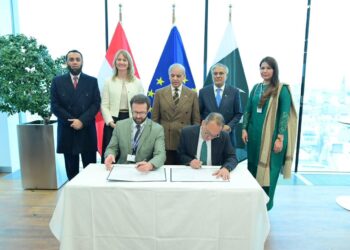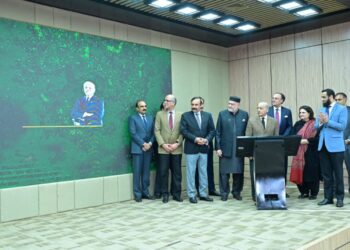Rawalpindi– In a significant development for Pakistan’s economic landscape, Field Marshal General Asim Munir held an important meeting with top business leaders of the country to review the current state of the national economy and discuss future-oriented economic reforms. The high-level meeting emphasized the need for immediate policy measures to stabilize the economy, boost exports, and encourage investment across various sectors.
Overview of the Meeting: Uniting Military Leadership and Economic Stakeholders
The meeting took place at General Headquarters (GHQ) Rawalpindi, reflecting the increasing collaboration between Pakistan’s military leadership and the private sector to tackle the nation’s economic challenges. Led by former caretaker Federal Commerce Minister Gohar Ijaz, the delegation included influential representatives from the textile, commerce, agriculture, and industrial sectors. Prominent participants were:
- Kamran Arshad – Chairman of All Pakistan Textile Mills Association (APTMA)
- S.M. Tanveer – Leading industrialist and member of Punjab’s business community
- President of FPCCI – Federation of Pakistan Chambers of Commerce & Industry
- President of Lahore Chamber of Commerce & Industry (LCCI)
These leaders represented various sectors that form the backbone of Pakistan’s economy, with a shared commitment to revitalizing growth and ensuring macroeconomic stability.
Key Discussion Points: Economic Revival, Policy Reforms, and Business Facilitation
The core agenda of the meeting revolved around enhancing coordination between policymakers and business stakeholders. General Asim Munir was briefed on several critical aspects, including:
1. Current Economic Landscape
Gohar Ijaz provided a comprehensive overview of Pakistan’s economic performance, including GDP trends, inflation rates, interest rate impacts, fiscal challenges, and trade dynamics. He stressed that the country is at a turning point and that timely, well-planned reforms are essential to prevent further economic deterioration.
2. Support for Government Policies
The business community, as reiterated by Gohar Ijaz, remains supportive of the current government’s economic direction. However, they called for accelerated implementation of reforms that directly impact investment and industrial growth. The businessmen pledged their continued support, provided the government facilitates an environment conducive to business and investment.
Proposed Economic Reforms and Recommendations by Business Leaders
The business delegation submitted a set of key recommendations aimed at improving the economic health of the nation. These included:
A. Reduction in Interest Rates
One of the most urgent appeals made by the delegation was regarding monetary policy, specifically the high interest rates, which have stifled investment and slowed industrial production. Gohar Ijaz argued that the current interest rate must be brought in line with the prevailing inflation rate to incentivize borrowing, stimulate entrepreneurship, and revive small and medium enterprises (SMEs).
“A business cannot operate profitably if the cost of capital is higher than the return on investment. Lowering the interest rate is essential to reignite economic activity,” he emphasized.
B. Reforms in Federal Budget 2025–26
Concerns were raised regarding the Federal Budget 2025–26, which, according to business leaders, needs further alignment with ground realities. Key issues included:
- Taxation policies affecting exporters and manufacturers
- Lack of incentives for small businesses
- The need for a simplified tax regime
- Elimination of double taxation
The business community urged the government to honor its pre-budget commitments, especially those related to export facilitation, tax refunds, and power tariff reductions for export-oriented industries.
Strengthening Export-Oriented Sectors
The delegation strongly advocated for a robust export policy, as boosting exports remains a fundamental driver for economic stability and foreign exchange generation. Suggestions included:
- Revising energy pricing mechanisms for export sectors such as textiles
- Fast-tracking sales tax refunds
- Incentivizing value-added exports
- Expanding export zones across provinces
APTMA Chairman Kamran Arshad said the textile sector alone could contribute significantly to Pakistan’s economic revival if provided with consistent support in terms of power tariffs, raw material availability, and market access.
Revitalizing the Cotton Industry and Agricultural Economy
Another critical area of focus was the agriculture sector, particularly the cotton industry, which has suffered from years of neglect and inconsistent policies. Gohar Ijaz highlighted that:
- Pakistan’s cotton production has declined drastically in recent years.
- Textile mills now import large quantities of cotton, resulting in foreign exchange losses.
- Reviving domestic cotton farming would reduce import dependence, enhance rural incomes, and create jobs.
He proposed that the government launch a comprehensive cotton development initiative, including:
- Distribution of certified cotton seeds
- Farmer subsidies and training
- Investment in agri-technology
- Cotton procurement and pricing reforms
This would not only boost agriculture but also create a ripple effect in industries that rely on raw materials from the sector.
Encouraging Inclusive Growth: Women, Youth, and SMEs
The business delegation also stressed the importance of inclusive economic policies to harness Pakistan’s demographic potential. Proposals included:
- Youth entrepreneurship programs supported through microfinance
- Women’s economic empowerment through skill training and digital inclusion
- SME support policies with tax relaxations and ease of doing business reforms
General Asim Munir reportedly appreciated the role of the private sector in creating job opportunities and emphasized the importance of inclusive growth for national security and social harmony.
Pakistan Army’s Role in National Development
Field Marshal Asim Munir reaffirmed the Pakistan Army’s commitment to supporting all national initiatives aimed at economic stability and prosperity. He highlighted that economic security is directly linked to national security and that the military leadership is fully aware of the socio-economic challenges facing the country.
He stated that cooperation between civil institutions, private stakeholders, and defense leadership is crucial in overcoming these challenges.
Future Outlook: Public-Private Collaboration for Economic Revival
The meeting concluded with a commitment from both sides to continue dialogue and cooperation for Pakistan’s economic revival. Business leaders expressed optimism that with transparent governance, investor-friendly policies, and strong institutional support, the country could emerge from its current economic crisis.
Gohar Ijaz reiterated the business community’s readiness to work with all stakeholders in implementing structural reforms and transforming Pakistan into a self-reliant, export-led economy.
Conclusion: A Pivotal Moment for Economic Reforms in Pakistan
The interaction between Field Marshal Asim Munir and the country’s leading business figures underscores the importance of multi-sectoral collaboration to address Pakistan’s economic challenges. With global financial conditions tightening and internal structural problems mounting, such meetings are vital for shaping effective economic strategies.
The call for reduced interest rates, agricultural development, tax reform, and export promotion reflects a unified voice of the private sector, which seeks not just survival, but a roadmap to sustainable growth.
As the country gears up for transformative policy shifts, the role of Pakistan’s business community—backed by institutional commitment—will be key to navigating the road to recovery.

























